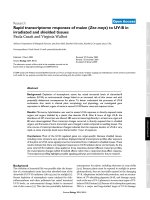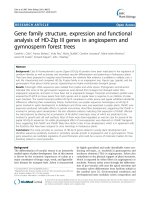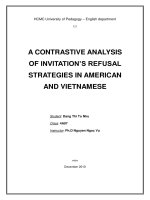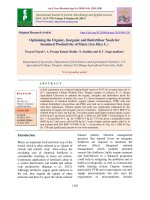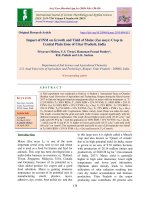Stochastic analysis of maize (Zea mays) production in betul and Madhya Pradesh, India
Bạn đang xem bản rút gọn của tài liệu. Xem và tải ngay bản đầy đủ của tài liệu tại đây (197.72 KB, 6 trang )
Int.J.Curr.Microbiol.App.Sci (2018) 7(10): 2446-2451
International Journal of Current Microbiology and Applied Sciences
ISSN: 2319-7706 Volume 7 Number 10 (2018)
Journal homepage:
Original Research Article
/>
Stochastic Analysis of Maize (Zea mays) Production
in Betul and Madhya Pradesh, India
R.B. Singh1, Navneet Rathore1, S.K. Pysai2, Umesh Singh3 and P. Mishra4*
1
Department of Mathematics & Statistics, JNKVV, Jabalpur, 482004 (M.P.), India
2
College of Agriculture Engineering, JNKVV Jabalpur, India
3
College of agriculture, Tikamgarh, (M.P.), JNKVV, India
4
College of agriculture, Powarkheda, (M.P.), JNKVV, 461110, India
*Corresponding author
ABSTRACT
Keywords
Maize, Correlation
coefficient, Compound
growth rate
Article Info
Accepted:
18 September 2018
Available Online:
10 October 2018
The purpose of present study was to describe the growth rate study for some time series
production factors of maize and also making of diagnostic study for detecting some
influential time series production factors governing total Maize production in Betul district
and also in Madhya Pradesh during the period 1988 -2017. The secondary data was
collected for analysis from Directorate of economics and statistics and
. The maximum compound growth rate had been obtained at
fertilizer distribution of maize i.e. 10.8 percent in Betul but the minimum support price of
maize i.e. 8.20 percent in Madhya Pradesh. The minimum growth rate is observed in area
of maize i.e. 1 percent in Madhya Pradesh but the productivity of Maize i.e. 2.60 percent in
Betul. Correlation and path analysis delineated that the area and the price of maize had a
high positive effect of 2.812 and 1.014 in Betul District.
Introduction
Maize (Zea mays) is the third most important
cereal crop in the world after wheat and rice.
Maize is a domesticated grass of tropical
mexican origin which belongs to large and
important family of Poaceae. It is a tropical
crop and most of the area under this crop is
however in the warmer parts of temperate
region and in humid subtropical climate and is
highest in area having the warmest month
isotherms from 210c to 270c and a frostfree
season of (120 180) days. Maize grains serve
as raw material for manufacture of starch,
syrup, dextrose, maltoidextrin, oil, lactic acid
and butyl alcohol. In truth starch serve as raw
material for paper, textile, adhesive, binding
material, braveries and pharmaceutical
industries. In India during 2011-12 maize was
cultivated in area of about 7.27 million hectare
with a production of about 15.86 million
tonnes and 2181 kg/ha productivity
(Agropedia, 2011-12). Madhya Pradesh is a
maize producing state contributing (5.7
percent) to the national production.
During 2015-16 maize was cultivated in an
area about 1098ha. With production of 2580.3
tones and 2350 kg/hectare productivity.
(.)
2446
Int.J.Curr.Microbiol.App.Sci (2018) 7(10): 2446-2451
In Betul, during 2015-16 maize was cultivated
in an area of about 56.50 ha with the
production of 133 tones and 2355 kg/ ha
productivity
(http:/www.mp.gov.in/en/mpkrishi/arg-st/districtwisearea).
Materials and Methods
The data were collected from Directorate of
Economics
and
Statistics
and
.
In accordance with the objectives delineated,
the time-series data pertaining to five
important factors viz. X1 = Area („000‟ ha.),
X2= Production („000‟t) X3= Productivity
(t/ha), X4= Minimum statutory price (Rs/ Q),
X5= Fertilizer distribution („000‟t) of 30 years
(1988 to 2017) both for Betul district and
Madhya Pradesh state as a whole.
Growth rate study of time series production
factors on maize
Singh et al., (2012) pointed out that the major
factors influencing the productivity for maize
in Betuldistrict.
Statistical Diagnostics 340 testing the
influential times reproduction factors
governing total Maize production
Simple correlation coefficients among the five
factors were computer to study the strengths
of their interrelationships in respect of Betul
district and Madhya Pradesh as a whole.
Correlation does not say anything about the
cause and effect relationship. Sewall Wright
(1921) developed and applied the method of
path analysis for the purpose of interpretation
of a system of correlation coefficient in terms
of path of causation. To diagnose the
important factors which have their direct and
indirect influence on the total maize
production, the technique of path coefficient
analysis has been employed. If Y is the effect
and X1, X2 and X3 are causal factors, then the
set of equations are
In order to study the growth rate, the wellknown growth model was fitted with respect
to each factor. The model is
,
(Sahu and das, 2009)
Where, Xit is the response of the ith factor in
the tth year, αβ are unknown parameters to be
estimated in the model, t is time element
which takes the value 1, 2, 3, ….. n and ξit is
multiplicative error [ ξit‟s ⁓IID (0,σ2]
The above growth model was linearised by
using logarithmic transformation and the
unknown parameter was estimated by ordinary
least square (OLS) method.
Where, r1y, r2y and r3y are the simple
correlation coefficient between each of the
causal factors with the effect, Y and P1y, P2y,
and P3y are direct effects of the causal factors
to the effect Y. The residual effect (effect due
to the casual factors to the effect, Y which
have not been included in the analysis) h, is
computed as-
From the fitted model compound growth rate
percent was computed as:
Results and Discussion
CGR= (Antilog b-1)*100, where,
estimated value of β.
The results emanated from the data considered
under the purview of this investigation are
b is
2447
Int.J.Curr.Microbiol.App.Sci (2018) 7(10): 2446-2451
presented as follows: Table 1 reveals the
growth dynamics of maize production factors
for Madhya Pradesh and Betul. It is seen that
the maximum compound growth rate had been
obtained at the fertilizer distribution of maize
i.e. 10.8 percent in Betul but the minimum
support price of maize i.e. 8.20 percent in
Madhya Pradesh. The minimum growth rate is
observed in the area of maize i.e. 1 percent in
Madhya Pradesh but the productivity of maize
i.e. 2.60 percent in Betul. The maize
productivity in Madhya Pradesh as well as
Betul had been found the minimum growth
rate; it mean that the farmers may divert their
lands for another crop so there is need to
increase the yield by the use of high yielding
varieties and other crop management
practices.
Table 2 shows that the average area of maize
in Madhya Pradesh is 847.72, where as in
Betul district 31.26 and percentage
contribution of Betul to Madhya Pradesh 3.68
percent with coefficient of variation 12.34
percent and 57.29 percent respectively. The
average production of maize in Madhya
Pradesh 1284.25 percent and percentage
contribution of Betul to Madhya Pradesh is
4.28 percent with coefficient of the variation
38.66 percent and 80.85 percent respectively
and the average productivity of maize in
Madhya Pradesh is 1480 kg/ ha and
percentage contribution of Betul to Madhya
Pradesh age 106.76 percent with coefficient of
variation 26.24 percent and 14.61 percent
respectively. The average minimum support
price in Madhya Pradesh is 585. 17 and
coefficient of variation 66.99 as well as Betul
and percentage contribution of Betul to
Madhya Pradesh is 100 percent. The average
fertilizer distribution in Madhya Pradesh is
342.04 where in Betul district 14.27 and
percentage contribution of Betul to Madhya
Pradesh is 4.17 percent with coefficient of
variation 45.88 percent and 81.96 percent
respectively.
A simple technique for calculation of path
coefficient taking correlation matrix among
X‟s variable had been used. The correlation
coefficient for the different pairs of variables
are assessed and shown in Table 3. Path
analysis results aimed to diagnose the direct
and indirect effect of important factors on the
total maize production which is summarised in
Table 4 with respect to Betul and Madhya
Pradesh as a whole respectively. From the
Table 3, it is observed that the production of
maize is positively correlated with maize area
(0.837), productivity (0.781), minimum
support price (0.769) and fertilizer distribution
(0.859). It was also noticed that the area,
productivity, minimum support price and
fertilizers distribution has a significant
relationship with the maize production. These
components exhibited interrelationship with
each other. This shows that the importance of
these components as production attributing
factors. It has been observed that the
production of maize is positively correlated
with maize area (0.900), productivity (0.957),
minimum support price (0.734) and fertilizers
distribution (0.800). From the table it was also
noticed that area, productivity, minimum
support price and fertilizer distribution has the
significant relationship with the maize
production. These components exhibit
interrelationship with each other. This shows
the importance of these components as
production attributing factors.
The analysis in Table 4 shows that the
diagonal elements represent direct effects and
the off -diagonal elements represent indirect
effects. This indicates that area had a high
positive effect of (2.812) followed by price of
maize (1.014) on total maize production in
Betel district. Table 4 represents the path
coefficient
analysis
between
selected
parameters and maize production in Madhya
Pradesh. The analysis shows that the diagonal
elements are direct effect and the off-diagonal
elements represent indirect effect.
2448
Int.J.Curr.Microbiol.App.Sci (2018) 7(10): 2446-2451
Table.1 Fitted the growth models and compound growth rates of factors of
Maize during 1988 to 2017
Factors
X1
X2
X3
X4
X5
Fitted growth models
MP
Betul
t
X1=719.84×1.010
X1=10.18×1.063t
X2=799.03×1.027 t
X2=10.61×1.089t
X3=1.09×1.017 t
X3=0.99×1.026t
t
X4=138.95×1.053
X4=138.28×1.082t
X5=138.95×1.053 t
X5=1.96×1.108t
CGR (%)
MP
Betul
1.00
6.30
2.70
8.90
1.70
2.60
8.20
8.20
5.30
10.8
Table.2 Averages, coefficient of variation with respect to maize factors and their percentage
contributions to Madhya Pradesh from Betul district during 1988 to 2017
Factors
MP
Betul
Percentage of Betul to M.P
Mean
C.V. (%)
Mean
C.V. (%)
X1
847.72
12.34
31.26
57.29
3.68
X2
1284.25
38.66
54.93
80.85
4.28
X3
X4
1480.0
585.17
26.24
66.99
1580.00
585.17
40.61
66.99
106.76
100
X5
342.04
45.88
14.27
81.96
4.17
Table.3 Correlation of maize production in Betul and Madhya Pradesh
Factors
X1
X3
X4
X5
Y = X2
Betul
X1
1
X3
0.399*
0.786**
0.983**
0.837**
1
0.549**
0.429*
0.781**
1
0.865**
0.769**
1
0.859**
X4
X5
Madhya Pradesh
X1
X3
X4
1
0.762**
0.794**
0.906**
0.900**
1
0.651**
0.690**
0.957**
1
0.957**
0.734**
1
0.800**
X5
** Correlation is significant at 1% level, *correlation is significant at 5% level
2449
Int.J.Curr.Microbiol.App.Sci (2018) 7(10): 2446-2451
Table.4 Path coefficient analysis of maize production in Betul and Madhya Pradesh
Parameters
X1
X3
Betul
0.150
2.821
1.124
0.375
2.209
0.206
2.763
0.161
Madhya Pradesh
0.477
0.572
0.437
0.626
0.145
0.407
0.519
0.432
X1
X3
X4
X5
X1
X3
X4
X5
X4
X5
0.796
0.556
1.014
0.907
-2.921
-1.275
-2,660
-2.972
0.145
0.120
0.183
0.175
-0.295
-0.224
-0.311
0.311
Table.5 Direct and indirect influence of maize factors on the total maize production in Betul and
Madhya Pradesh
Factors
Direct
influences
X1
X3
X4
X5
2.812
0.375
1.014
-2.972
X1
X3
X4
X5
0.572
0.626
0.183
-0.325
Rank of direct
Total indirect
influences
influence
Betul
1
-1.975
3
0.405
2
-0.245
4
3.831
Madhya Pradesh
2
0.327
1
0.333
3
0.241
4
1.126
This table indicates that the productivity had
highest direct positive effect (0.626) followed
by area (0.572) on total maize production in
Madhya Pradesh. The study reveals the direct
and indirect contribution of maize production
factors in Betul district and Madhya Pradesh
is given in Table 5. Table 5 portrays
corresponding scenario prevailing with
respect of Betul. In fact, it reveals that maize
area is most direct influential factor for Maize
production with rank 1st followed by price of
maize with rank 2nd followed by productivity,
fertilizer distribution. The indirect effects
corresponding to order (again based on
Rank of indirect
influence
3
2
4
1
3
2
4
1
magnitude of indirect effects) have the
maximum magnitude of fertilizer distribution
with rank 1stfollowed by maize productivity,
which attained the rank 2nd followed by maize
area rank3rd. The findings emanated from the
above result of delineated below with respect
to Madhya Pradesh and are presented in Table
5. The value of positive direct effects of the
all factors in the total maize production in
Madhya Pradesh. The total maize production
has a direct effect on the maize productivity
rank 1followed by maize area rank 2, price of
maize rank 3 then fertilizer distribution in
Madhya Pradesh. It was found that the
2450
Int.J.Curr.Microbiol.App.Sci (2018) 7(10): 2446-2451
corresponding descending order with respect
to the factors was fertilizer distribution via
area of maize then the price of maize
respectively.
JNKVV, Jabalpur, Madhya Pradesh for
valuable suggestions and facilities.
Based on the above finding it may be
concluded that an increased in factors like
area will enhance maize production in Betul
and Madhya Pradesh respectively by directly
and indirectly. Specifically, the factors viz.,
maize area, production, productivity affected
by minimum support price and fertilizers
distribution. This study brings out the fact that
the relationship between time series
production factors and help to maize
production.
Directorate of economics and statistics
Mpkrishi.org.
/>xhindi.aspx
Sahu, P.K. and Das, A.K. (2009). Agricultural
and applied statistics-II Kalyani
publishers, New Delhi. 388 p.
Sewall Wright (1921). Correlation and
Causation. 29 p.
Singh, N.R., Ambika R., Meena, S., Jat, S.L.,
Kumar, R. and Kumar, S. (2012). “Rabi
maize
opportunity
challenges”.
Directorate of maize research Pusa
Campus, New Delhi-110012, Technical
Bulletin, 9:32p
Acknowledgement
The authors are grateful to the dean and head,
department of mathematics and Statistics
References
How to cite this article:
Singh, R.B., Navneet Rathore, S.K. Pysai, Umesh Singh and Mishra, P. 2018. Stochastic
Analysis of Maize (Zea mays) Production in Betul and Madhya Pradesh, India.
Int.J.Curr.Microbiol.App.Sci. 7(10): 2446-2451. doi: />
2451




